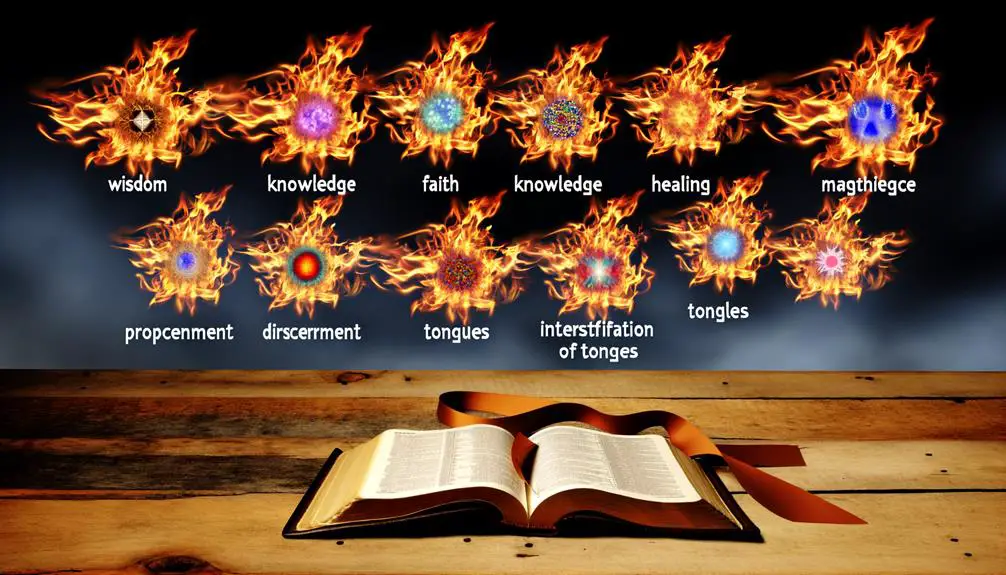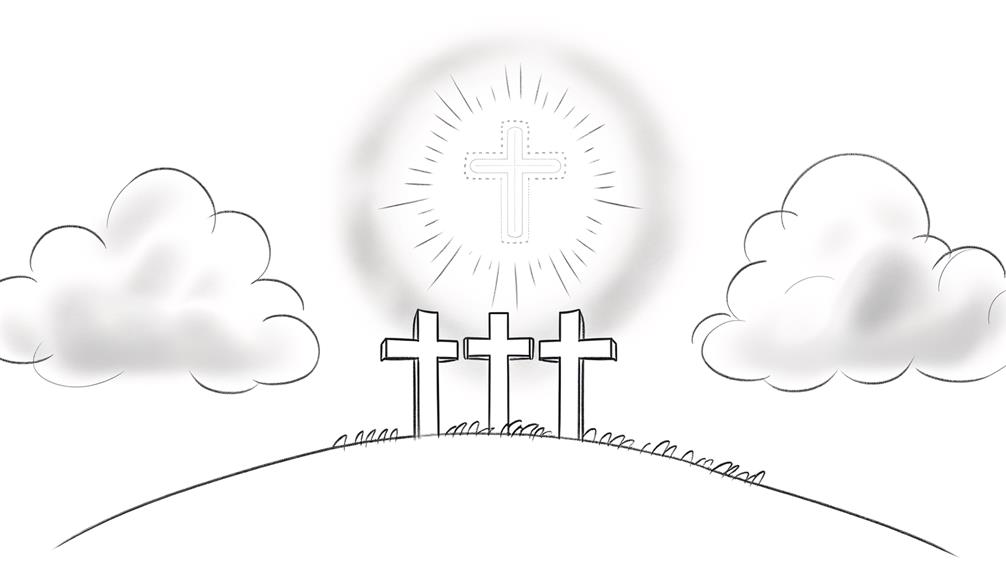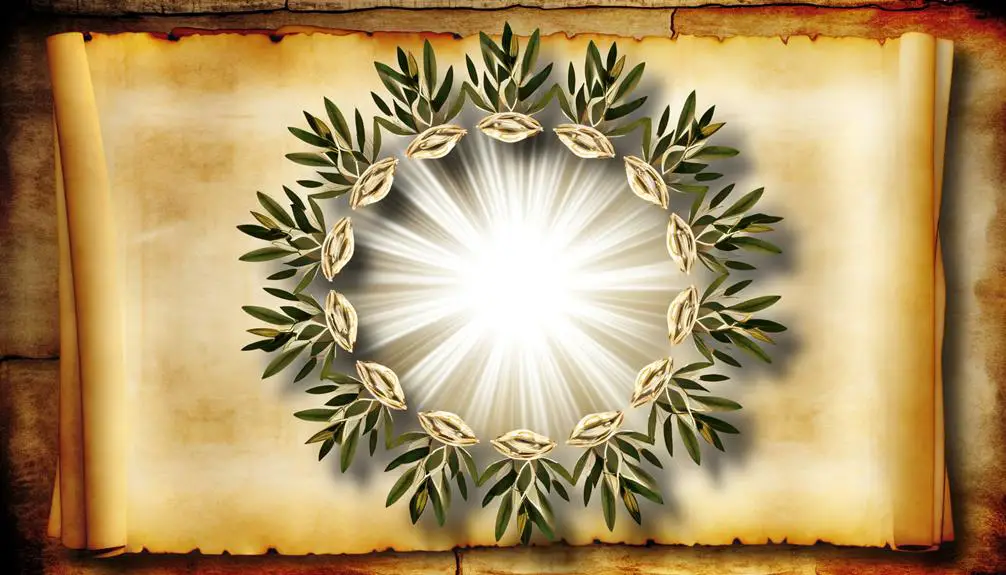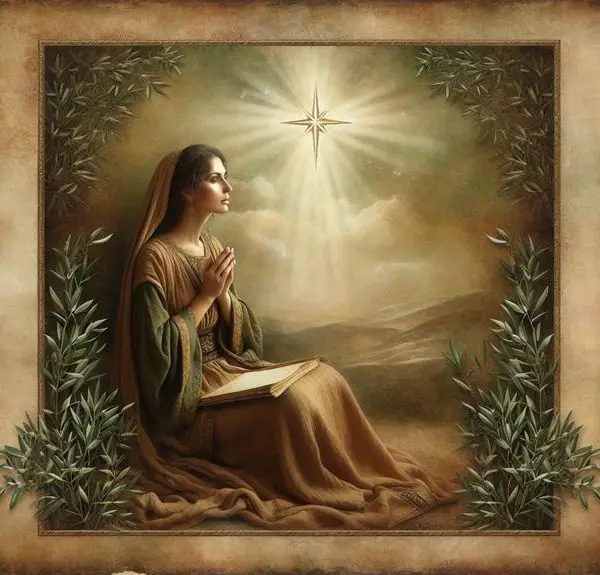Discover how the number nine symbolizes divine completeness in the Bible, revealing hidden layers of spiritual significance.

What Does Nine Mean in the Bible
When you think about significant numbers in the Bible, you might not immediately consider the importance of nine. Yet, it's a number that carries profound spiritual significance, such as being the moment Jesus breathed his last on the cross at the ninth hour, marking a pivotal moment in Christian faith.
This instance is just the tip of the iceberg, as nine also represents the fruits and gifts of the Holy Spirit, each aspect revealing deeper layers of spiritual wisdom and truths. As you explore further, you'll uncover how this number weaves through biblical narratives, offering insights into divine completeness and the very fabric of spiritual law.
Key Takeaways
- Nine symbolizes divine completeness and finality, reflecting the well-ordered structure of the universe.
- It holds spiritual significance, representing gifts of the Spirit for believers' growth and service.
- The ninth hour and events on the ninth day underscore its role in divine providence and human history.
- Nine fruits of the Spirit emphasize ethical living and character refinement through divine influence.
The Symbolism of Nine

In biblical terms, the number nine symbolizes divine completeness and finality, reflecting its significant appearances and implications throughout the scriptures. This numeral isn't just a figure; it's imbued with profound spiritual significance, embodying concepts that are both esoteric and exoteric in nature. When you delve into the depths of its meaning, you uncover layers that extend beyond its mere appearance in the text, reaching into the realms of the nine heavens and the organization of the angelic choirs.
The concept of nine heavens is pivotal in understanding the structured complexity of the celestial domain. It's not merely an imaginative construct but a symbolic representation of the various levels of heaven, each tier ascending in holiness and proximity to the Divine. You're invited to contemplate the structured hierarchy of the cosmos, where the angelic choirs, categorized into nine orders, inhabit these heavenly realms. This celestial architecture mirrors the divine order, emphasizing the theme of completeness and finality that nine represents.
Each choir of angels, from Seraphim to Angels, embodies a specific aspect of God's creation, reflecting His glory and majesty. The number nine, in this context, isn't arbitrary but deliberate, signifying the all-encompassing nature of God's creation and governance. It encapsulates the idea that nothing is beyond His realm, reinforcing the notion of divine completeness.
Through the lens of nine, you're encouraged to perceive the universe not as a chaotic expanse but as a well-ordered cosmos, where every entity and level has its place and purpose. This insight into the symbolic significance of nine in the Bible offers a richer understanding of the divine order, inviting you to appreciate the intricate balance and harmony that governs both the celestial and the terrestrial.
Nine Gifts of the Spirit

Reflecting on the structured hierarchy of the cosmos and the symbolic significance of the number nine, it's imperative to explore how this numeral manifests through the Nine Gifts of the Spirit as outlined in the scriptures. These gifts are pivotal for spiritual empowerment and play a crucial role in the Charismatic renewal movement within the Christian community.
The Nine Gifts of the Spirit can be classified into three categories: Revelatory, Power, and Vocal. Each category encompasses gifts that equip believers to serve the body of Christ effectively, fostering a deeper connection with the divine.
Revelatory Gifts |
Power Gifts |
Vocal Gifts |
|---|---|---|
Word of Wisdom |
Faith |
Prophecy |
Word of Knowledge |
Healings |
Different Kinds of Tongues |
Discerning of Spirits |
Miracles |
Interpretation of Tongues |
Revelatory gifts like the Word of Wisdom and Word of Knowledge provide insight into the divine will and the mysteries of the faith. Power gifts, including Faith, Healings, and Miracles, demonstrate God's sovereign power over creation, affirming His presence and benevolence. Vocal gifts, such as Prophecy and Different Kinds of Tongues, facilitate divine communication, edifying the church and promoting spiritual growth.
The distribution of these gifts, as divinely orchestrated, underscores the importance of unity and diversity within the Christian community. It's through these spiritual gifts that believers are equipped for service, embodying the fullness of God's power and grace. The understanding and application of these gifts are foundational to the believer's journey towards spiritual maturity and charismatic renewal.
Jesus and the Ninth Hour

You must recognize the pivotal role of the ninth hour in biblical narratives, especially in the context of Jesus' crucifixion.
This moment is marked by profound symbolism, including darkness and despair, underscoring its significance as a fulfillment of prophecy.
Analyzing this period offers deep insights into its theological implications and highlights its critical importance in Christian doctrine.
Crucifixion Timing Significance
The crucifixion of Jesus at the ninth hour carries profound theological significance, marking a pivotal moment in Christian doctrine. This moment, aligned with ancient Roman practices, underscores not only the brutality of the method but also the day's significance within the Jewish context.
The ninth hour, traditionally seen as the hour of prayer, becomes the backdrop against which the ultimate sacrifice for humanity's sins is highlighted. By choosing this specific time, the narrative intricately weaves the fulfillment of Old Testament prophecies with the New Testament's message of salvation.
This deliberate timing doesn't merely reflect historical practices but elevates the event, inviting deeper reflection on the interplay between divine providence and human history within the framework of salvation history.
Darkness and Despair Moment
Building on the crucifixion's timing, it's essential to explore the moment of darkness and despair that enveloped the world at the ninth hour, highlighting a critical juncture in biblical narrative and theological interpretation. This moment, rich in symbolism, offers a profound insight into the nature of sacrifice and redemption.
- Modern Interpretations: Scholars view this as a pivotal event that challenges and deepens our understanding of divine abandonment and human suffering.
- Psychological Impact: The narrative conveys a universal experience of despair, resonating deeply with human emotions and existential questions.
- Theological Significance: It underscores the profound mystery of God's participation in human suffering, inviting a deeper contemplation on the nature of salvation and divine love.
This analysis reveals the layered complexity and enduring relevance of this moment in the biblical text.
Fulfillment of Prophecy
At the ninth hour, Jesus's crucifixion aligns precisely with ancient prophecies, marking a moment of profound theological fulfillment and divine orchestration. This pivotal event showcases the prophetic accuracy embedded within Biblical texts, affirming the reliability and divine inspiration of Scripture.
You're observing not just a historical moment, but a meticulously planned fulfillment of prophecy, underscored by its timing. This singular moment's global implications are vast, bridging theological divides and underscoring the universality of salvation's message.
It's a testament to the interconnectedness of prophecy, history, and theology, demonstrating how specific moments in time can hold immense significance in the broader narrative of faith. The ninth hour, therefore, isn't just a detail; it's a profound symbol of fulfillment and divine precision.
Nine Fruits of the Spirit

Delving into the concept of the Nine Fruits of the Spirit, you'll find they embody essential virtues for spiritual growth and ethical living. These fruits, as outlined in the Biblical book of Galatians, serve not merely as ideals but as tangible markers of character development. They're crucial in a believer's life, reflecting the indwelling presence of the Holy Spirit and the transformative power of divine grace.
The significance of these fruits extends beyond individual piety; they're foundational to building strong, ethical communities. Each fruit interweaves with the others, creating a comprehensive framework for moral conduct and interpersonal relationships. This framework isn't static but dynamic, encouraging continuous growth and refinement of one's character.
To understand their impact, consider the following three fruits:
- Love: The cornerstone of spiritual maturity, love transcends mere affection, embodying selfless action towards others.
- Joy: Unlike fleeting happiness, joy is a deep-seated sense of contentment, rooted in faith, that withstands life's trials.
- Peace: More than the absence of conflict, peace encompasses an inner tranquility that stems from trust in divine providence.
These virtues, along with the remaining six, aren't innate but cultivated through deliberate practice and divine influence. They signify not only personal spiritual growth but also contribute to the moral fabric of society. The Nine Fruits of the Spirit thus offer a blueprint for ethical living, inviting individuals to reflect divine attributes in their daily lives.
Historical Events on the Ninth

You'll find that the number nine holds significant weight in biblical narration, particularly when examining pivotal historical events.
The Ninth Plague of Darkness, the Ninth Hour Crucifixion, and Pentecost, occurring on the ninth day, each serve as profound instances where this numeral emerges with deep theological implications.
These events not only underscore the recurrence of nine as a symbol of judgment and divine revelation but also highlight its role in the unfolding of God's redemptive plan.
Ninth Plague: Darkness
In an exploration of the Ninth Plague, we encounter a profound episode of darkness, symbolizing divine judgment and emphasizing the severity of God's actions against Egypt. This darkness wasn't merely a natural phenomenon; it held deep Egyptian significance and acted as a precursor to global darkness in biblical narratives.
- Egyptian Significance: Darkness directly challenged Egypt's sun god, Ra, symbolizing the defeat of their primary deity and showcasing the supremacy of the God of Israel.
- Divine Judgment: It represented a tangible manifestation of God's displeasure, a physical embodiment of divine retribution against Pharaoh's stubbornness.
- Global Darkness Symbolism: Beyond Egypt, the plague foreshadowed moments of spiritual and physical darkness, demonstrating the extent of God's power over creation and human affairs.
Ninth Hour Crucifixion
Reflecting on the theme of darkness and divine intervention, the Ninth Hour Crucifixion marks another pivotal moment where biblical narrative intertwines with historical events to illustrate the power and purpose of God's actions. This event, deeply embedded within Christian doctrine, showcases the intersection of Roman customs and execution methods with profound theological implications.
At the ninth hour, considered mid-afternoon by Roman timekeeping, Jesus Christ's crucifixion reaches its culmination. This timing isn't merely coincidental but is imbued with significant symbolism, echoing the darkness of the Ninth Plague. The execution, following Roman customs, serves as a stark backdrop to a moment of divine intervention, highlighting the transformative power of faith and the fulfillment of prophecy.
This convergence of historical and divine narratives underscores the meticulous orchestration behind biblical events, reinforcing the depth of God's involvement in human history.
Pentecost: Ninth Day
Marking a significant event in Christian history, Pentecost falls on the ninth day after Ascension Thursday, symbolizing the fulfillment of Jesus's promise to send the Holy Spirit to his disciples. This pivotal moment offers a profound exploration of number nine's symbolism within biblical narratives, particularly in the context of feast origins and cultural interpretations.
- Feast Origins: Pentecost originates from Jewish Shavuot, adapted by Christians to commemorate the Holy Spirit's descent.
- Symbolic Significance: The ninth day underscores a transitional period, reflecting spiritual fulfillment and divine promise.
- Cultural Interpretations: Across cultures, this event unites believers, showcasing the universal appeal and adaptability of Pentecost's message.
This analysis underscores how Pentecost, occurring on the ninth day, enriches our understanding of biblical numerology through its historical and cultural resonance.
Numerology and Divine Completeness

While exploring biblical numerology, it's crucial to understand that the number nine symbolizes divine completeness, a concept deeply embedded in scriptural passages and theological interpretations. This notion isn't arbitrary but stems from discerning numerical patterns and their spiritual significance within the Bible's fabric. Delving into these patterns reveals a consistent application of numbers to convey deeper theological truths, and nine's recurrence is notably significant.
You'll find that the spiritual significance of nine is multifaceted. It's not merely a figure; it encapsulates the culmination of God's works and the finality in the divine scheme of redemption and judgment. For instance, there are nine fruits of the Spirit listed in Galatians 5:22-23, which collectively represent the fullness of Godly character that believers are called to embody. Similarly, Christ's utterance of nine beatitudes in Matthew's Gospel provides a comprehensive blueprint for Christian living that leads to spiritual completeness.
Moreover, the use of nine in the context of judgment and finality is evident in God's pronouncement of nine judgments over Babylon in the book of Jeremiah, chapters 50 and 51. This not only underscores the completeness of God's judgment but also illustrates how divine completeness can encompass both redemption and retribution, depending on one's standing with God.
Understanding the number nine in these contexts enriches your comprehension of biblical messages and God's intricate design. It's a testament to how numerical patterns in scripture aren't coincidental but are infused with profound spiritual significance, revealing the meticulous nature of divine communication.
Frequently Asked Questions
How Have Different Cultures Outside of Christianity Interpreted the Significance of the Number Nine?
In different cultures, the number nine holds unique significances beyond Christianity. In Norse mythology, it's pivotal, representing the cosmos' structure with nine worlds. Hindu beliefs also revere it, symbolizing material wealth and spiritual enlightenment.
You'll find that these interpretations, steeped in ancient wisdom, highlight the number's universality and depth. Analyzing these perspectives, it's clear that nine's importance transcends individual cultures, embodying universal themes of creation, enlightenment, and cosmic order.
Are There Any Specific Prayers or Rituals in the Bible That Involve the Number Nine Directly?
In your exploration of biblical numerology, you'll find no specific prayers or rituals directly involving the number nine. However, it's intriguing to note the symbolic significance of nine, particularly in the context of the nine fruits of the Spirit and the nine gifts of the Spirit mentioned in the New Testament.
These elements underscore the spiritual completeness and divine qualities bestowed upon believers, offering a profound insight into the biblical narrative.
Can the Number Nine Be Linked to Any Specific Biblical Prophecies or Future Events as Interpreted in Modern Theology?
You're diving into how nine's symbolism ties into biblical prophecies or future events, particularly through eschatological interpretations. Scholars analyze this number for its significance, finding links to completion and judgment within scriptural prophecy.
While direct connections to specific future events are rare, the interpretive framework provided by modern theology suggests that nine may symbolize the finality and fulfillment of God's plans, echoing themes of divine retribution and the culmination of historical cycles.
How Do Contemporary Biblical Scholars View the Significance of the Number Nine in Relation to Emerging Biblical Interpretations and Discoveries?
As the adage goes, 'Numbers speak louder than words,' especially when you dive into the realm of numerical symbolism in biblical contexts.
Contemporary scholars meticulously analyze the significance of the number nine, engaging in scholarly debate over its role in emerging biblical interpretations and discoveries.
They sift through ancient texts and modern findings, offering insights that bridge historical understandings with contemporary perspectives, thereby enriching our grasp of biblical numerology's evolving narrative.
Are There Notable Differences in the Significance of the Number Nine Between the Old Testament and the New Testament That Go Beyond the Mentioned Sections?
You're looking into whether there's a distinct difference in how the number nine is portrayed in the Old Testament versus the New Testament.
It's crucial to note that the concept of Nine Commandments or Nine Tribes doesn't directly align with traditional biblical references.
However, in a scholarly analysis, the symbolic representation of nine may vary subtly between the testaments, reflecting evolving theological insights and historical contexts rather than a straightforward numerical significance.
Conclusion
In an ironic twist, the number nine in the Bible, often overlooked, holds profound significance. You'd think something so seemingly mundane would barely scratch the surface of biblical profundity.
Yet, it embodies divine completeness, from the gifts and fruits of the Spirit to Christ's crucifixion at the ninth hour, and even historical markers.
This intricacy, wrapped in a single digit, underscores a divine irony: what appears trivial is, in fact, deeply embedded in the fabric of spiritual and historical narratives.



Sign up